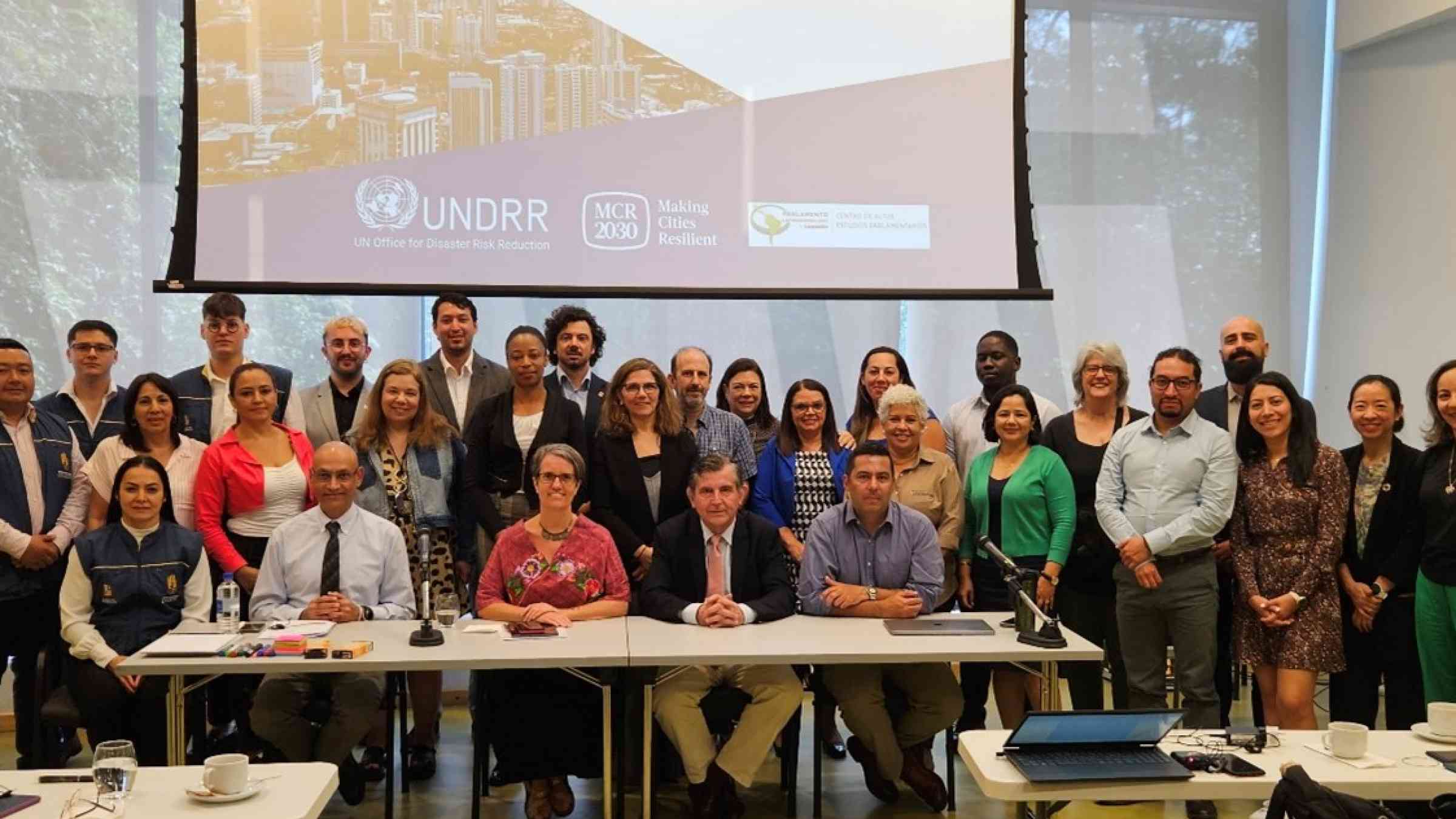Governments in the Americas and the Caribbean enhanced capacities to finance sub-national DRR and climate resilience actions

Access to capital markets is critical for cities to realise climate resilience transitions and manage the increasing frequency of disasters. Yet, limited capacity to prioritize disaster risk reduction (DRR) & climate actions and ability to leverage finance continue to hinder the progress especially at the sub-national level.
Responding to the call for actions as emphasized in the Political Declaration of the high-level meeting on the midterm review of the Sendai Framework for Disaster Risk Reduction 2015–2030, the United Nations Office for Disaster Risk Reduction (UNDRR) Global Education and Training Institute (GETI) and the Regional Office for the Americas and the Caribbean (ROAMC), in partnership with the Climate Bonds Initiative (CBI) organized a 4-day workshop to enhance sub-national capacities focusing on accessing funds for implementation.
20 Representatives from 6 countries in the Americas and the Caribbean, namely Dosquebradas, Colombia; Santa Ana, Costa Rica; Quito, Ecuador; Panama City, Panama; Montevideo, Uruguay, and Jamaica advanced the understanding and skills on various tools to help them pivot from DRR and climate change adaptation (CCA) planning to implementation.
“This training responded to the regional demand for capacity building opportunities to improve understanding and skills on climate resilience and its integration into disaster risk reduction plans,” said Ms. Saskia Carus, Deputy Chief of UNDRR Regional Office for Americas and the Caribbean. “Local authorities in the region often lack the tools and knowledge to develop proactive strategies for climate adaptation and disaster resilience.”
The first two days of the training focused on new tools: the Climate Resilience Addendum to the Disaster Resilience Scorecard for Cities, developed in collaboration with the Development Bank of Latin America and the Caribbean (CAF); and the Scorecard Action Guide with a focus on prioritizing actions and preparing to convert them into investment projects, developed in collaboration with ARISE-US Private Sector Alliance for Disaster Resilient Societies.
Mr. Oscar Guevara, Chief Executive of the Climate and Environmental Action Division at CAF emphasized the strong support to UNDRR in strengthening capacities of governments on sub-national DRR and CCA implementation.
“CAF supports countries in addressing DRR and CCA actions as investment projects. This requires expanding the alternatives for mobilizing financial resources, beyond non-reimbursable resources, and accompanying countries to structure proposals and operations aligned with national and international climate adaptation commitments”.
To further support participants in moving from project ideas to implementation, the last two-days of the training, led by the Climate Bonds Initiative (CBI), focused on equipping government officials with the knowledge and skills necessary to issue green bonds and identify alternative financing for the effective implementation of climate actions.
Training participants were exposed to various capital market options including bonds, blended and pooled financing, development funds, loans, public-private partnerships, and other alternatives. The training also covered the issues of credit worthiness, credit risk, currency mitigation, and how to identify strategies to reduce risks. Participants had an opportunity to present their climate project ideas to investors and financiers, providing opportunities for further financial partnerships after the training.
“We are delighted to have partnered with UNDRR to tackle the critical issues of disaster risk reduction and climate resilience for cities in the region. Providing national and sub-national entities with the essential knowledge, tools and resources empowers the cities to obtain sustainable finance and build the essential climate-resilient infrastructure for the future," said Mike Brown, Municipal Finance Lead of CBI.
The Head of UNDRR Global Education and Training Institute, in Incheon, Republic of Korea, Mr. Sanjaya Bhatia added: ‘This training provides a practical approach for local governments to scale up their understanding, ambition, and actions to reduce climate and disaster risks and is an excellent opportunity to leverage the experience of many partners of the Making Cities Resilient 2030 (MCR2030) in addressing the gaps faced by sub-national governments on accessing finance for implementation.’
The training was joined by representatives of the World Council on City Data (WCCD), an MCR2030 Core Partner and a driver of sub-national entity certification for the ISO37123 – Indicators for Resilient Cities.
“Data transparency can help cities gain the trust of financiers,” said Ms. Patricia McCarney, President and CEO of WCCD. “We are keen to explore together with UNDRR and CBI how data can support cities in increasing the opportunities to access finance.
This intensive week provided a unique window of opportunity to translate climate and resilience solution discussions into tangible actions for the cities of the Americas and the Caribbean. The workshop took place on 16-19 October 2023 as part of the MCR2030 initiative and was hosted by the Latin American and Caribbean Parliament (Parlatino) and the Centro de Altos Estudios Parlamentarios in Panama City, Panama.
MCR2030 is a United Nations-led global partnership that has mobilized 30 national governments, 10 national municipality associations, and more than 1,640 local governments from 85 countries and territories, committed to strengthening local disaster and climate resilience. MCR2030 strives to see strengthened national-local linkage supporting sub-national governments’ advancement towards disaster and climate resilience and sustainable development.

